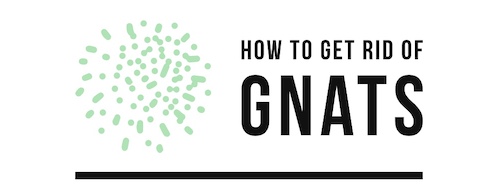Identifying the Causes of Gnats in Your Home
Gnats are small, flying insects that can be a nuisance in the home. They are attracted to moist areas and feed on decaying organic matter. Identifying the causes of gnats in your home is the first step to getting rid of them.
Moisture: Gnats thrive in moist environments, so it’s important to keep your home dry and well-ventilated. Check for any leaks or standing water around windows, sinks, and other areas where moisture may accumulate. Make sure all drains are properly sealed and unclog any slow-draining pipes or fixtures.
Organic Matter: Gnats feed on decaying organic matter such as food scraps, pet waste, and plant debris. Clean up any spills or messes immediately and dispose of food waste properly in sealed containers or bags outside your home. Vacuum regularly to remove crumbs from carpets and furniture that may attract gnats into your living space.
Houseplants: Houseplants can be a breeding ground for gnats if not maintained properly. Check soil for signs of mold or mildew growth which can attract gnats into your home from outside sources such as gardens or compost piles nearby. Change out soil regularly to prevent infestations from occurring inside your houseplant pots as well as trimming away dead leaves which can also provide an ideal environment for these pests to breed in large numbers quickly if left unchecked over time .
By identifying the causes of gnat infestations in your home you will be able to take steps towards eliminating them before they become a major problem inside living spaces throughout the year!
How to Get Rid of Gnats in Your House
Gnats are small, pesky insects that can be a nuisance in your home. They are attracted to moist areas and feed on decaying organic matter, such as fruits and vegetables. If you have gnats in your house, there are several steps you can take to get rid of them.
1. Identify the source of the gnats: Gnats often come from decaying organic matter or standing water sources such as sinks or drains. Check for any rotting food or standing water and dispose of it immediately.
2. Clean up: Thoroughly clean all surfaces in your home with a disinfectant cleaner to remove any remaining food particles that may be attracting the gnats. Pay special attention to areas where food is prepared or stored, such as countertops and cupboards, as well as bathrooms and other damp areas where gnats may breed.
3. Use traps: Traps can be used to capture adult gnats before they lay eggs in your home; these traps usually contain an attractant such as vinegar or fruit juice which lures the insects into a sticky surface where they become trapped and die off quickly without reproducing further infestations of gnats in your house .
4. Use insecticides: Insecticides containing pyrethrin can be used to kill adult gnat populations; however, these products should only be used if other methods have failed since they may also harm beneficial insects like bees and butterflies if not applied correctly .
5. Prevent future infestations: To prevent future infestations of gnats in your house , make sure all potential breeding sites are kept dry by fixing leaky pipes or faucets promptly; store fruits and vegetables properly so they don’t rot; keep garbage cans covered tightly; empty pet dishes regularly; use screens on windows and doors ;and vacuum regularly .
Natural Ways to Repel and Prevent Gnats from Entering Your Home
Gnats are small, pesky insects that can be a nuisance in your home. Fortunately, there are several natural ways to repel and prevent them from entering your home.
1. Keep windows and doors closed as much as possible. This will help keep gnats out of the house since they cannot fly through closed windows or doors.
2. Use essential oils such as peppermint, lavender, eucalyptus, or citronella to create a barrier around the perimeter of your home that will repel gnats away from the area.
3. Place cloves in areas where you have seen gnats congregating; this will help deter them from coming back to those areas again due to their strong scent and taste aversion properties of cloves for gnats.
4. Hang sticky traps near windows and other entry points into your home; these traps attract gnats with their sweet smell and trap them on the adhesive surface so they cannot enter your house any further than that point!
5. Plant certain herbs such as basil, mint, rosemary or thyme around the perimeter of your house; these herbs contain natural compounds which act as repellents for many types of insects including gnats!
6 .Keep all food covered when not in use; uncovered food is an attractive source for many types of pests including gnats so make sure it is always covered up when not being eaten or prepared!
7 .Clean up any standing water sources near your home; standing water can be a breeding ground for many types of pests including gnats so make sure all sources are cleaned up regularly!
By following these simple steps you can effectively repel and prevent gnat infestations in your home without having to resort to chemical treatments or pesticides which may be harmful to both humans and pets alike!
The Benefits of Using Insecticides to Control a Gnat Infestation
Insecticides are a common and effective way to control gnat infestations. Gnats, also known as fruit flies or vinegar flies, are small flying insects that can be found in homes and businesses. They feed on decaying organic matter such as fruits and vegetables, as well as other food sources. Gnats can quickly become a nuisance if left unchecked.
Insecticides are designed to kill or repel pests like gnats by disrupting their nervous systems or interfering with their reproductive cycles. Insecticides come in many forms including aerosols, dusts, baits, granules, liquids and sprays. Each type of insecticide has its own advantages and disadvantages depending on the situation at hand. For example, aerosols provide quick knockdown of adult gnats but may not be effective against larvae; while liquid insecticides may take longer to work but will provide long-term control of both adults and larvae.
Using insecticides is an effective way to reduce the number of gnats present in an area quickly and efficiently without having to resort to more drastic measures such as fumigation or extermination services. Insecticides can also help prevent future infestations by killing off any remaining eggs or larvae that may have been missed during cleaning efforts prior to treatment with the insecticide product. Additionally, using insecticides is often less expensive than hiring professional pest control services for larger infestations over extended periods of time.
When using any type of pesticide it is important to read all instructions carefully before use in order to ensure proper application techniques are followed for maximum effectiveness against the target pest species (in this case gnats). It is also important that all safety precautions listed on the product label be followed closely when handling any type of pesticide product in order protect yourself from potential health risks associated with exposure or misuse of these products
Common Mistakes People Make When Trying to Eliminate a Gnat Problem
1. Not Identifying the Source of the Problem: Gnats are attracted to moisture, so it is important to identify and eliminate any sources of standing water or dampness in your home. This could include leaky pipes, clogged drains, or even wet towels left on the floor.
2. Not Cleaning Regularly: Gnats are attracted to food particles and other organic matter that accumulates in kitchens and bathrooms over time. Regularly cleaning these areas with a disinfectant can help reduce their presence in your home.
3. Not Using Traps: Traps such as sticky fly strips or pheromone traps can be effective at catching gnats before they become a problem in your home.
4. Overusing Insecticides: While insecticides may kill some gnats, they will not solve the underlying problem and may even make it worse by killing off beneficial insects that help keep gnat populations under control naturally.
5. Ignoring Outdoor Sources: If you have an outdoor source of gnat infestation such as a compost pile or standing water near your house, you must address this issue first before attempting to eliminate them indoors as they will just keep coming back if not addressed properly outdoors first

